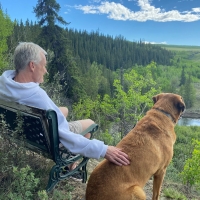Selling a house can be an emotional undertaking, a journey of self-discovery. It is a bittersweet experience as we downsize to simplify our lives.
Our peaceful home and the soothing nature reserve alongside it has been a haven to me and our family for almost two decades. It’s a place where I connected with my soul on walks in the forest, where I have meditated in the stillness and beauty of the valley, where our family appreciated the beauty of nature.
However, I’m coming to realize that a large part of my motivation to acquire this property was my need to prove myself and it has consumed much of my energy. That my worth has been tied to this place came, in part, from my early upbringing, driven by the voice of my mother who lived through poverty in the depression and who defined herself by her belongings as a result. This drive for status acquired from material possessions became part of my personal identity and has been a weight on my shoulders.
Like all patterns we create, this pattern has both a good side and a destructive one. I still love an aesthetic home that feeds my soul and am proud that we created that space for myself and loved ones. However, I know that the source of the drive to sustain it was not good for my wellbeing. In the words of the Quaker theorist of the simple life, John Woodman, I “necessitated to labour too hard.”
This struggle brings to mind Aristotle’s challenge to an external-oriented life which is as relevant today as it was twenty-three hundred years ago. He identified “external goods” as wealth, property, power, and reputation. These still create the standard vision of success in our modern times. Aristotle contrasted these external goods with elements of character or the “good of the soul”: fortitude, temperance, justice, and wisdom. When we consider what we truly want for ourselves and our children, are we overly concerned about being wealthy and successful? Or is success a means to the higher goal of being a good human being?
This transition to downsizing has inspired me to reconnect with my deepest self. Letting go is agonizing, yet it is leading me to a deeper homecoming to my authenticity.
I am looking forward to living more simply in this complex world, with less pressure and more focus on work that matters to me and the activities in life that I truly value. It’s never too late to start anew. And a huge reminder of this is that my new granddaughter, Juno, has just arrived! I look forward to spending more time with her.
Here are three lessons from my experience that I hope will be useful on your path to a simpler life:
- Practice making decisions based on sustainable values, not emotions. Decisions motivated by appearances, impressions, and impulses most often lead to a financial burden that you don’t need to carry.
- The good life is not one of consumption or size or external appearance, but of the flourishing of our deepest selves. It’s ultimately about the expression of love, giving of ourselves, and developing strong character.
- True belonging and worth ultimately don’t come from a physical place. They come from within.





